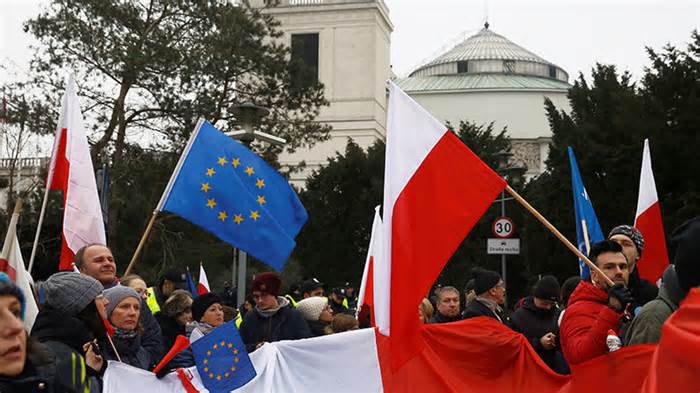Poland – Sunday, October 13, 2019, Poland held parliamentary elections. The Law and Justice Party, PiS, won the victory unsurprisingly, extending its mandate for four years.
Proportional voting for the Diet – Polish Parliament – and one-round majority for the Senate was held on Sunday, October 13, 2019, throughout the country. The real issue was whether the PiS would keep its absolute majority on the one hand, and whether the radical left would return to parliament or not. In the end, both occurred.
The Pis won the election with 43.59% of the vote, obtaining because of the D’Hondt method, 51% of seats in the Diet, and 48% of Senate seats. The Christian conservative party ruling since 2015 achieves the best score obtained by a party in the history of legislative elections since the holding of free elections in 1991. In 2015, the PiS won with 37.58% of the vote.
And this score is all the more remarkable as these elections also had a record of participation, with 61.16%, a significant increase compared to 50.92% in 2015. Previously, the participation record was 53.88% in the elections of 2007.
The patriotic, economically successful and socially engaged policies – especially regarding families and young people – of the government have undoubtedly been the key elements of the repeated success of the Christian conservative PiS: unemployment at historic lows of 5.20 , the introduction of large family allowances, the rise of the minimum wage, the victorious fight against tax evasion, the reduction of fiscal deficits, GDP growth of around 4% a year, are all elements retained by voters as being the fruits of PiS policies.
The return of the radical left and the spread of LGBT networks
However, the frenzied activism of the globalist, liberal-libertarian and LGBT networks led to a resurrection of the radical left which with its “Democratic Left Alliance” gets back into the parliament with 12.56% of the votes, thus arriving in third position behind their allies in the European elections of the civic platform (PO), former conservative party that has shifted to Europeanism and opened itself to the LGBT lobby and immigrationism. Having obtained a score of 27.40%, the KO (Democratic Coalition, a liberal alliance built around the PO), together with the Democratic Left Alliance, accumulate nearly 40% of the votes. A not insignificant score in this country of 40 million inhabitants, known for its conservatism and its Catholic faith.
In the opposition since 2015 after betraying the Polish electorate on the migration issue – the Kopacz government had accepted the quotas of migrants -, the PO made a left turn in parallel with the social and conservative shift of the PiS, which does not has never been soft on the issue of migration – despite its permissiveness regarding labor immigration. But for many observers, PiS’s great strategic success is based on its social and family policies.
Such topics are neglected by the left of this early 21st century, which focuses on societal themes and uses methods of destabilization and of social engineering, like in Hungary and all the countries of the former Eastern bloc in particular, enjoying very important foreign support, particularly within the institutions of the European Union.
For example, LGBT propaganda has boomed in Poland in recent years under successive PiS governments. If in 2015 the will of Brussels to impose quotas of migrants had given a boost to the party of Jarosław Kaczyński, the strongman of the PiS, this year it is the adoption by the liberal opposition of the LGBT lobby’s dogmas that allowed the PiS to present itself to the Poles as the party of moderates facing the party of those who would like to impose on Poland a societal revolution and a soft totalitarianism like in the West.
Nationalism as antibodies, the agrarian party back to conservatism
Part of the electorate (6.81%) spoke in favor of the Confederation, a heterogeneous alliance of libertarians, monarchists, nationalists and Christian conservatives. Seen as an antibody motivated by the progress of the LGBT and globalist agenda, imposing itself as a critical formation regarding the PiS and pressuring it from the right, more radical and more coherent than the defunct alliance around the anti-system Kukiz in 2015, Confederation becomes a potentially useful opposition force to the PiS.
Kukiz, who had formed a coalition with the nationalists in 2015, this time joined the agrarian party, collecting together 8.55% of the vote. This coalition presents a conservative image, by opposition to the recent alliance of the agrarian party with the PO in a liberal bloc of the left during the last European elections.
PiS: 4 more years
In the end, the PiS gets the reins of the country for four more years, and can rely on an unprecedented electoral legitimacy in democratic Poland. This popular mandate will probably allow Jarosław Kaczyński to further his plans for deep reforms, family policy, and struggle, alongside his Hungarian accomplice Viktor Orbán in particular, for another European Union more respectful of the rights of the States and nations. But the liberal left, radicalized and supported by the cosmopolitan and LGBT networks, as well as by many senior European Union officials unwilling to avoid interference in the name of respect for democracy, will form a strong opposition and will be difficult to manage for the PiS.




